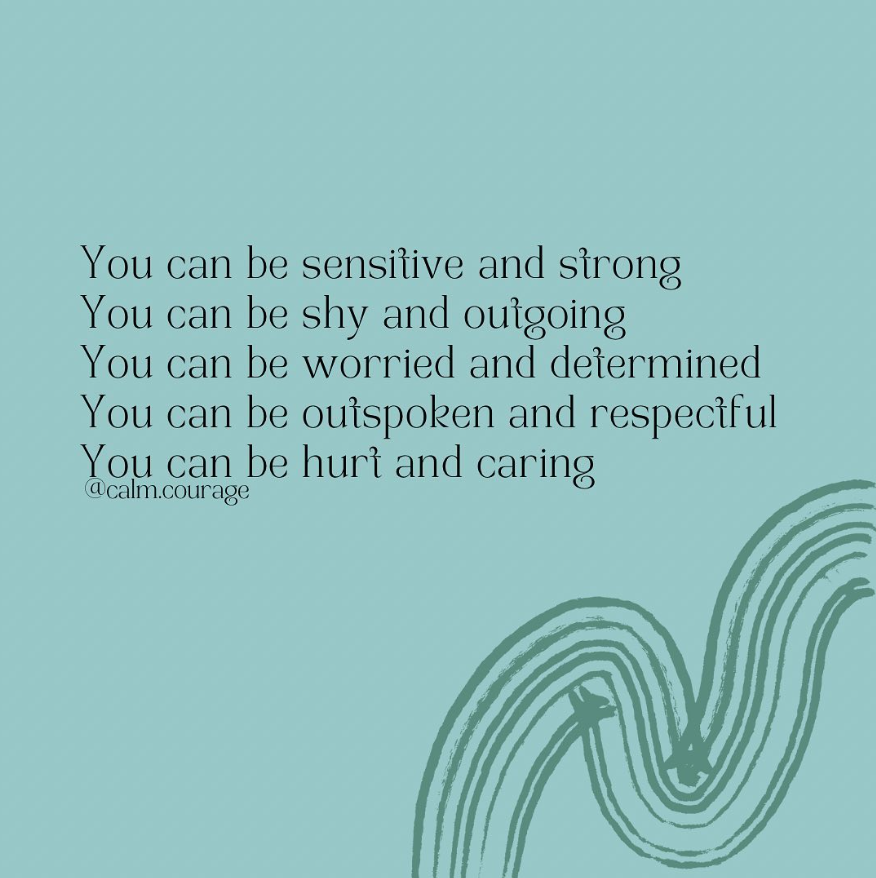Can You Really Stop Being a People Pleaser?
Nowadays, we often hear about ways to put an end to people-pleasing behaviours. But let’s pause for a moment and consider this: is it possible people-pleaser traits are so deeply rooted in someone’s personality it’s impossible to stop being a people pleaser?
People-pleasing behaviors can deeply affect us. Particularly those with heightened sensitivity and emotional depth. It can feel like an natural part of who we are (sometimes an uncontrollable aspect of our personality), making it challenging to break free and truly be authentic.
In this article, we explore the connection between sensitivity, emotional depth, and the tendency to be a people pleaser, to discover the answer to whether you can really stop being a people pleaser.
First, let’s explore the meaning of people-pleasing
Medical News Today describes people-pleasers as:
“(A person who) feels a strong urge to please others, often at their own expense”
Generally, people-pleasing looks like:
- Avoiding conflict
- Having a hard time saying “no”
- Jumping to agree
- Needing to be happy and upbeat all the time
People-pleasers often prioritise the happiness and well-being of others. This unintentionally hinders their ability to express themselves honestly, prioritise self-care, and maintain a healthy sense of self-worth. Sound familiar? It did for me up until recently.
People-pleasing is ultimately a coping mechanism that, on the surface, appears to be helpful to others. What’s the harm in being kind, right? It helps avoid conflicts and provides a sense of safety and control.
However, behind the acts of kindness and consideration, people-pleasers are often unaware of their actions and unable to control their people-pleasing behaviors.
Thus, because people-pleasing tendencies are viewed as positive traits, they can be challenging to overcome without first delving beneath the surface and examining the underlying motivations.
On a side note, when it comes to parenting, some level of people-pleasing is considered acceptable because parents have a responsibility to care for their children, and it’s natural for their priorities to overlap.
Who is prone to people-pleasing?
For most, people-pleasing is subconscious. For others, genetics play their part. But fundamentally, to be a people-pleaser, you need:
- Empathy
- To be caring and considerate
- Be a great listener
According to research, you are even more likely to be a people-pleaser if you are:
- An HSP (Highly Sensitive Person)
- An empath (high amounts of empathy to the point of feeling and sensing others’ emotions)
- An INFJ (introverted, intuitive, feeling and judging personality type)
- A survivor of trauma such as childhood emotional neglect
- Someone who grew up with narcissistic parents
- Neurodivergent
All of these personality types and traits equate to a more sensitive, caring and emotional person. They are more prone to anxiety and being overwhelmed by their emotions because they feel and think deeply. Thus, the perfect candidates for people-pleasing.
What this means is some of us are more inclined to people-pleasing behaviours than others, by nature or unfortunate circumstances such as abuse or neglect.
What’s the difference between an empath and a people-pleaser?

Both empaths and people-pleasers are highly-considerate and intuitive. It’s important to recognise their people-pleasing behaviors stem from a genuine desire to help and connect with others.
Empaths have the natural ability to understand the emotions of others. On the other hand, people-pleasers often adopt their people-pleasing behaviors overtime as a coping mechanism.
Thus, empaths are often people-pleasers, but people-pleasers are not always empaths.
Signs you are a people-pleaser
Highly agreeable
Imagine you are an eco-enthusiast. Someone shares with you their decision not to recycle, even though recycling services are available in their neighborhood.
You understand the importance of recycling for the planet and how the benefits far outweigh any perceived inconvenience. However, instead of expressing your differing opinion or asking why they feel that way, you simply nod in agreement. You choose harmony over voicing your own values.
This scenario may seem far-fetched, but it illustrates a common tendency to be overly agreeable in order to please others. In these moments, you may suppress your own voice and perspectives, elevating the opinions and values of others.
You may believe you are making the best decision by avoiding confrontation or disagreement. However, it’s important to recognise that in doing so, you unintentionally minimise your own voice to give way to that of others.
You attract narcissists
Narcissism is a popular buzzword, frequently appearing in shows, movies, and even songs these days. But what exactly is a narcissist?
Traditionally, a narcissist is someone who possesses an inflated sense of self-worth and importance. They often disregard and belittle others and struggle with empathy. There’s also another common type called the covert narcissist, whose tactics are more subtle and elusive (if the name didn’t give it away). These individuals commonly adopt the role of the victim to manipulate and gain favor, sympathy, and attention.
To paint a more positive picture, it is important to note many narcissists are unaware of the harmful effects of their behavior on others. Also, some narcassists are high on the scale of narcassism, whilst others show a few traits.
Narcissism, like people-pleasing, stems from underlying insecurities. However, people-pleasers are not conniving or believe they are superior to others. This distinction is crucial.
Narcissists thrive on superiority, which is why they’re often portrayed as tyrannical leaders in the media (think Meryl Streep playing the role of “terrible boss” Miranda Priestly in The Devil Wears Prada). Their focus centers around power, attention and control. Consequently, they often have no issue manipulating and minimising the feelings of the more submissive and considerate people-pleaser.
They employ various tactics to manipulate and control others, including gaslighting, where they distort the truth and make you question your own reality.
They may even act as though they know more about your life than you do. I have personally experienced this situation, and I am grateful I no longer work alongside that individual (*sigh of relief).
Narcissists may exert influence by convincing you their way is the only correct path, leading you to base life decisions on their opinions. This makes it incredibly challenging to regain control over people-pleasing tendencies, let alone overcome them.
They feel satisfaction from gaining the undivided attention and care of others. Unfortunately, at its worst (narcassistic abuse), this dynamic can erode our sense of self and confidence.
You feel the need to be liked which makes it difficult to stop being a people pleaser
First, let’s get something straight. Everyone has a need to be liked. Even introverts, who may not like to admit it at times (I’m guilty!).
Community-led alliance describes this as:
“Intrinsic to our existence as humans comes a need to be seen and understood – a need to belong. Finding people who share our experiences, values, and interests is what reminds us of our worth and that we’re not alone.”
However, when the need to be liked surpasses the need to feel supported and loved, we enter people-pleasing territory. In other words, basing our value on how many or how much people like us.
Hence, people-pleasing behaviours arise, such as the willingness to keep people happy by acting the way they expect. Whether that’s doing favours without hesitation, acting as part of a group we don’t feel a deep connection to, or not being able to share harder feelings out of fear they’ll be glossed over.
It’s the need for external over internal validation. Their view over yours.
This can negatively affect our authentic power which lies in speaking and acting out our truth. We’ll get more into authenticity later.
You’re a giver
Are you someone who derives joy from helping others and going the extra mile to bring a smile to their face? If so, there’s no denying you are kind and compassionate.
However, it’s worth considering whether this giving nature extends to times when you actually want to say no, have other plans, or simply want some time for yourself.
If you find yourself nodding in agreement, you’ve identified a sign of people-pleasing in your behavior.
In a perfect world, everyone would express themselves authentically and people would listen without judgement. People wouldn’t have the ability to control others. Everyone would feel at ease in their Being with or without validation.
But the reality is some of us take a little training (or a lot *hands over face*)when it comes to saying no without guilt, acting confidently, and prioritising ourselves.
So, can you really stop being a people pleaser?
For certain individuals, shedding their people-pleasing tendencies may come easier, especially if these patterns are not deeply ingrained in their personality. Also, if they have enough self-awareness or are willing to explore themselves enough to identify their people-pleasing behaviours and minimise them.
However, those who possess a natural inclination towards kindness, self-sacrifice and high-empathy will find it more challenging to completely let go of people-pleasing behaviours. It is likely these individuals will continue to exhibit some people-pleasing behaviors throughout their lives.
It is also crucial to acknowledge the distinction between kindness and people-pleasing. Kindness can be expressed authentically without the need to suppress one’s truth. On the other hand, people-pleasing tendencies stem from negative emotions and self-beliefs, leading to behaviors that prioritise the desires and approval of others above one’s own well-being.
How to stop being a people pleaser (well… as much as possible)
Recognising voicing your opinion doesn’t guarantee conflict
Many people-pleasers have had their feelings invalidated or have been put down by others. As a result, they develop a fear of conflict, avoiding it at all costs in order to shield themselves from the pain of feeling hurt, rejected, or unseen.
Personally, I have encountered instances where I’ve been gossiped about and spoken over. It took me years to overcome the effects of those experiences and regain the confidence to voice my opinions.
However, in retrospect, I’ve come to understand their behavior was merely a reflection of their own need for attention and inclusion, rather than anything I was doing to provoke it. I am also now aware of my high levels of empathy which not everyone can reciprocate.
Considering this, I can sympathise if you have encountered similar situations. If you are sensitive by nature, like myself, it can be particularly challenging to navigate through such instances. Whether it is a sibling, friend, or coworker, such encounters that leave you feeling minimised or invalidated can leave you feeling disheartened or not able to let your full personality shine through.
Individuals with healthy levels of self-confidence and self-worth are adept at navigating conversations involving conflicting perspectives. They are open to the ebb and flow of dialogue and receptive to candid honesty, unlike people-pleasers who instinctively put up walls in an unconscious effort to maintain harmony.
If you relate to this, once you come to the realise that voicing your opinion does not have to be confrontational, or a threat to the positivity and safety of a conversation, you gain the freedom to express your true thoughts and feelings more authentically.
In fact, you may even find yourself enjoying debates and discussions. Personally, I have reached this stage in my recovery from people-pleasing (if we can call it that). I have come to understand and better support myself.
This journey away from people-pleasing is more about self-understanding and self-empowerment, allowing us to engage in dialogue with confidence and without compromising our true perspectives.
Everyone should feel safe to express themselves with authenticity. No environment or person should have the power to prevent that.
However, understandably not so easy in an age where images of beauty and success persuade us to conform. Or within societies less accepting of authenticity, such as within totalitarian countries.
Thus, it’s easy to see why many people hold back and guard the more open and vulnerable parts of themselves and consequently many of their opinions.
Growing up as a people-pleaser due to my sensitivity, empathy, and later trauma-fueled behaviors, what hindered my self-expression the most? Ironically, it was not being able to fully express myself the way I wanted to, with all my rawness and quirks.
Only when I actively faced my people-pleasing habits head-on could I notice and minimise them.
I learnt…

Here are some other lessons I’ve learnt in recent years:
Speaking up doesn’t make you cruel
This is a continuation of the last point…
Expressing ourselves openly and honestly can be particularly challenging for highly sensitive individuals (HSPs) and individuals with deep-thinking and empathetic personalities. People-pleasing tendencies often become ingrained as a result of our natural inclination to deeply feel and understand ourselves, others, and our surroundings.
As an HSP, I struggled to voice my thoughts because I mistakenly believed everyone shared my sensitivity. Consequently, I treated others with unwavering kindness, fearing any deviation from this would be seen as cruelty.
However, as I started on a journey of personal growth, I gradually gained the courage and self-assurance to challenge this belief. It became clear to me my excessive consideration for others was constricting my own voice. With time, I learned to manage my sensitivity better, becoming less affected by the actions and words of others.
I discovered speaking up and expressing my true thoughts and desires enabled me to communicate my needs and boundaries in a more authentic and assertive manner—yipee!
Everyone deserves the freedom to do that, no matter how naturally considerate and caring they are.
Prioritising yourself over others isn’t selfish or uncaring, but an act of kindness with powerful and transformative effects only you can show yourself.
Recognising you are as valuable as anyone
Many people-pleasers view themselves as lowly i.e. less valuable than others. There’s a sense of inadequacy. That’s one reason why they’re so accepting of the opinions of others.
Despite what the media portrays, every single person is equal. Put aside money, belongings, and titles, and you’re left with the flesh, blood, bones, and souls of beautiful human beings. The only entity superior to us is our Creator, God.
So the next time you have a good point to make, why not voice it? Your opinion could educate, support or inspire.
Your viewpoint is important. You are worthy of sharing your unique insight.
Establishing healthy boundaries to help stop being a people pleaser
Another buzzword for you! Boundaries. But they are important, after all.
When you think about it, people-pleasers simply lack boundaries which are personal lines between what we do and do not accept, both emotionally and physically.
Today, let’s focus on emotional boundaries.
If you find yourself in a situation where someone is crossing a line with you, but you hesitate to speak up due to fear of conflict or upsetting them, it means your boundaries are being violated in some way.
Perhaps they unknowingly touched a nerve, but if their actions persist, it’s crucial to assert yourself and address their behavior.
Anyone who truly values you as a person will understand and respect when you establish new emotional boundaries to reduce or eliminate your people-pleasing tendencies and promote inner-peace.
You may feel like you’re being cruel when first setting boundaries. I get it. But give it some time. You’ll find your natural balance between healthy empathy and assertiveness.
Ultimately, it’s about communicating your needs when someone becomes too involved in your emotional space, decision-making, or consistently impacts your mood negatively. By doing so, you regain your power, retain self-control, and decrease the emotional triggers that often lead to people-pleasing behaviours.

Stop caring too much about what other’s think of you
Ooh.. this is a tricky one. From what we’ve established, people pleasers have high empathy. So, you’re naturally going to want to be considerate and kind.
But too much empathy means too much people pleasing.
Therefore, we need to self-examine.
Some great questions to ask yourself to uncover unhealthy levels of empathy:
- Am I scrutising or overthinking my movements and apperance?
- Do I struggle to say no when I want to?
- Am I living the way I want to, or am I really trying to keep someone else happy?
- Is there a part of me that knows i’m holding back?
If you said yes to any of these, it’s likely time to reexamine whether you care too much about what other people think. But please remember it’s normal to subsconsiously set standards for ourselves based on the society we live in. Often, these subconcious standards manifest into real life situations and decisions.
So, to prioritse what you want to do, ask:
How do I want to dress?
How can I express myself more authentically?
How do I want to spend my time?
What do I want to achieve in life?
I hope this article has provided useful insights on people-pleasing and ways to stop being a people pleaser to the best of your ability.
Recognising and addressing people-pleasing tendencies is a gradual process, but, take it from me, it can have a profound impact on your life and relationships.
You’ll start to like yourself more. Trust yourself more. And the right people will gravitate.
For more on people-pleasing and other personal growth related content, follow me on socials:


